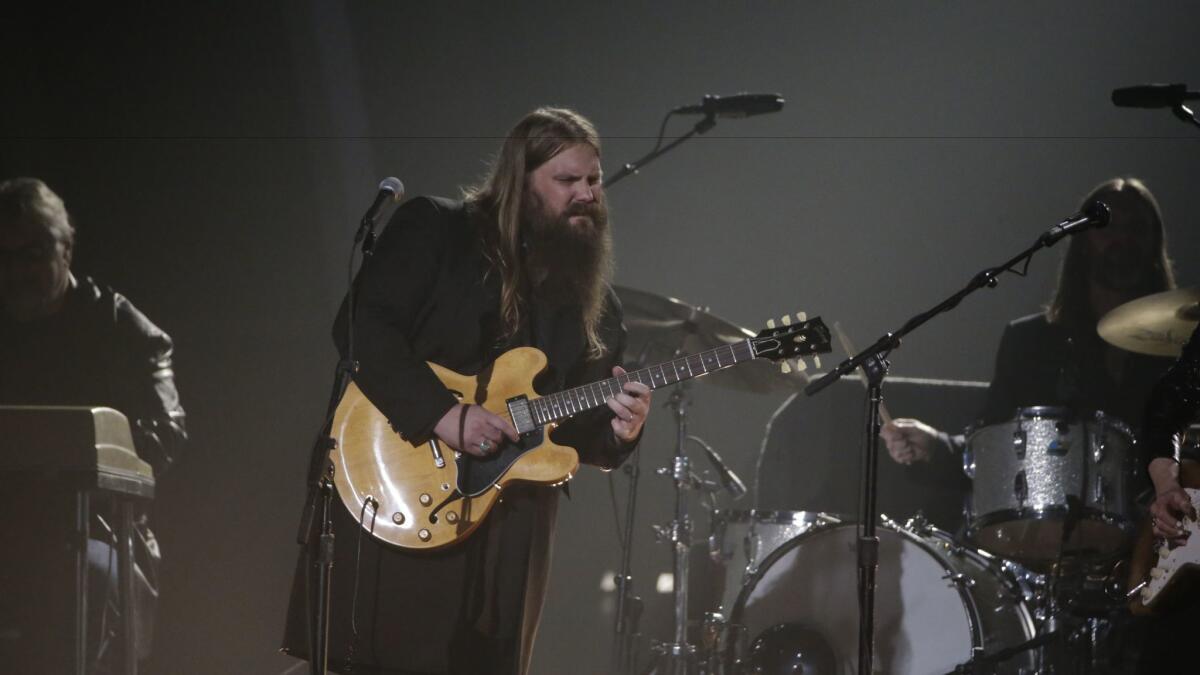With an album of the year nod for Sturgill Simpson, Grammys put the spotlight on surging Americana genre

- Share via
When the 2017 Grammy Award nominations were unveiled in December, a lot of fans had one question after perusing the names in the album-of-the-year field: Beyoncé, Adele, Drake, Justin Bieber and Sturgill Simpson.
Sturgill who?
For the record:
7:45 p.m. Jan. 23, 2025An earlier edition of this post stated that the Merriam-Webster dictionary added the term ‘Americana’ in 2015. It was added in 2011.
The nod to the latest work from the Kentucky-born singer and songwriter is just the most recent manifestation of the rising tide for the broadly defined category of Americana music, a corner of pop inhabited by such critically acclaimed acts as Simpson, Chris Stapleton, Mumford & Sons, the Avett Brothers, Emmylou Harris, Rhiannon Giddens, the Lumineers, Rodney Crowell, John Hiatt and Alison Krauss.
And no one was as surprised at the high-profile nomination as Simpson himself.
“I can’t believe I’m mentioned in the same breath with Adele, Beyoncé and all these huge pop artists,” Simpson told The Times on the day the nomination for his album “A Sailor’s Guide to Earth” was announced. “ ‘Mentally humbled’ is probably the best way to put it.”
Although party-minded sing-along hits from Florida Georgia Line, Luke Bryan, Jason Aldean and other so-called “bro-country” performers have dominated the airwaves of mainstream country radio in recent years, the more sophisticated songwriting that’s a hallmark of Americana has been seizing a larger and larger audience along the way.
“I don’t think it’s going to be erasing bro-country,” said Stacy Vee, director of festival talent for the L.A.-based concert promoter Goldenvoice.
“I think there are still a lot of people who want to have a good time and who love those guys. But I think what is happening is that Nashville is diversifying a little bit. With all the different ways you can get music now — with Spotify and all the streaming services — people are playing around a lot more with what the listen to.”
Stapleton’s record “Traveller” was the seventh bestselling album of 2016, with total equivalent sales of 1.4 million copies, a figure that includes physical sales and streaming numbers. That left Stapleton behind only such pop, rock and R&B superstars as Drake, Adele, Beyoncé, Rihanna, Twenty-One Pilots and Bieber.
That was one factor in Billboard magazine renaming its folk album sales chart in May as Americana/folk.
The reason? To “spotlight the middle ground bridging country and rock: organic, roots and acoustic-based groups and solo singer-songwriters,” magazine officials said.
“The change recognizes the growth of Americana music and the prominent rise of the term Americana overall, both within the industry and in widespread music coverage,” Billboard noted. “Among acts likely to continue to be a presence on the retooled Americana/folk albums chart include the Lumineers, Sturgill Simpson, James Bay, Margo Price and Jason Isbell.”
“It seems like Americana is growing,” said Ken Levitan, whose Vector Management firm represents a number of such acts, including Harris, Hiatt, T Bone Burnett, Richard Thompson, Buddy Miller and the Civil Wars’ John Paul White.
“I think part of it is that it’s real music, in a sense — not that other genres are not real music,” Levitan said. “But the Americana fans — as opposed to being a singles-based audience — seem to be an album-based audience, which translates into greater sales if somebody is going to buy a record.
“Chris Stapleton, who really is an Americana act, had one of the biggest-selling records of the year. When one of those types of acts works, they work in a big way.”

Voting members of the Recording Academy, who determine the Grammy Awards each year, have historically leaned toward the more progressive artists than the voters who dole out trophies from the Country Music Assn. and the Academy of Country Music.
In the new millennium, Grammys have been awarded to Stapleton, the Civil Wars, Kacey Musgraves, Alison Krauss & Union Station, Alabama Shakes and the Dixie Chicks. The overall album of the year Grammy has gone to Americana-linked acts including Mumford & Sons, Robert Plant & Alison Krauss and to the soundtrack of “O Brother, Where Art Thou?”
This year’s Americana album nominees are the Avett Brothers, William Bell, Kris Kristofferson, Lori McKenna and the Time Jumpers.
The “Americana” term has been in play since emerging in the early 1990s as an umbrella for roots music including one or more elements of country, folk, gospel, soul, blues and R&B.
Most rock historians trace that amalgam back to the freewheeling, border-blind music Bob Dylan made in 1967 with musicians soon to be known as the Band — later dubbed “The Basement Tapes.”
The genre has built considerable critical mass in recent years, much of it sparked since the 2009 arrival of British roots-rock group Mumford & Sons, whose debut, “Sigh No More,” and its even more commercially successful 2012 follow-up, “Babel,” helped inject banjos, mandolins, accordions and other folk instruments into the indie-rock world.
Boosting the importance of Americana as a genre of its own, the term was added in 2011 to the Merriam-Webster dictionary, which defines it as “a genre of American music having roots in early folk and country music.”
And for those whose business is working with the artists, there’s considerable enthusiasm.
“I think the mood is there’s an abundance of excellent Americana artists out there right now,” Vee said.
Vee books the 60 to 70 acts that perform each year at Goldenvoice’s Stagecoach Country Music Festival, a three-day gathering of talent in Indio that spans contemporary and traditional country, folk, bluegrass, Americana and even some indie-rock and classic-rock acts.
Music festivals have played an important role in the burgeoning of Americana, because many such as Stagecoach, Coachella, Outside Lands, Bonnaroo and Lollapalooza will include some genre-pushing acts, exposing them to audiences that might not otherwise hear their music.
“What’s happening is the increased exposure these artists are getting,” Vee said. “The typically country audience is loving Chris Stapleton and Sturgill Simpson and all these guys. There’s also the indie-rock and alternative-rock folks who are dipping their toes into the country waters for the first time…. It has piqued a lot of people’s curiosity.”
Billboard reported in its Oct. 22 chart issue that four Americana records had placed in the top 10 of the overall top 200 albums, which combines streaming, sales and airplay: Bon Iver‘s “22, A Million,” Bob Weir‘s “Blue Mountain,” Van Morrison‘s “Keep Me Singing” and Drive-By Truckers‘ “American Band.”
“Americana albums outsold R&B/hip-hop, dance and, most notably, country among the top album sales chart’s top 10,” Billboard wrote, adding that “it’s the first time the genre has bested country sales among weekly top 10 sellers since Billboard rebranded the folk albums chart as Americana/Folk Albums.”
That could have been a fluke — a coincidence of common release dates in the always busy fourth quarter, said David Bakula, senior vice president of industry insights for the Nielsen Music sales tracking service on which Billboard bases its charts.
More revealing is the long view of year-over-year results. Bakula confirmed that total sales for albums on the folk (and subsequently, Americana/folk) chart had increased about 14% in 2016 over the previous year, at a time when overall album sales continued to erode.
“It’s an increase in share and it’s a significant piece,” Bakula said.
How significant is tricky to determine because of the relatively amorphous definition of Americana, which leads some artists to be classified as indie rock, alternative rock, country or Americana/folk.
There’s no single reason for the growth of Americana, said John Allen, president of New West Records and a member of the Americana Music Assn.’s board of directors.
“I guess you’re seeing a perfect storm with organizations like ours supporting Americana, more festivals booking stuff like this, more streaming playlists — on YouTube, on Spotify, on Amazon,” Allen said. “You’re seeing more avenues of discovery that are not solely based on the stranglehold on country music that terrestrial radio has. And I think a lot of artists are making a lot of great records right now.”
Musicians, however, often rankle at being labeled.
“This whole labeling thing — I’m tired of being called an ‘Americana’ artist — either that or ‘country alternative,’ ” said acclaimed singer-songwriter Lucinda Williams, whose music of the late 1980s and early 1990s was a key part of the emerging Americana community of artists.
“I’ve been in almost every [Grammy] category,” she said, referencing her wins over the years for country song, contemporary folk album and female rock vocal, along with additional nominations in the Americana category, which was introduced in 2006 as contemporary folk/Americana, then shortened to Americana in 2009.
“I very rarely talk about this stuff. It’s all very mysterious.”
See the most-read stories in Entertainment this hour »
ALSO
Meet Busbee, the producer who helped Maren Morris get to the Grammys
‘No, take me seriously’: Meet the Regrettes and Cherry Glazerr, L.A.’s new faces of rock
With ‘Bad and Boujee,’ Migos is finally having its moment
More to Read
The biggest entertainment stories
Get our big stories about Hollywood, film, television, music, arts, culture and more right in your inbox as soon as they publish.
You may occasionally receive promotional content from the Los Angeles Times.










